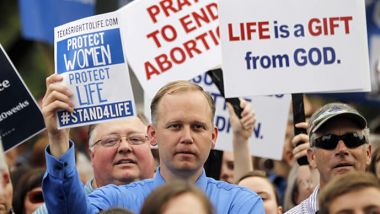Pro-choice women press U.S. Supreme Court to scrap Texas' anti-abortion law

The U.S. Supreme Court will hear on March 2 the case challenging Texas' new anti-abortion law and at this early, women who had ended their pregnancies have already submitted their personal stories to try to convince the High Court to strike down the restrictions.
More than 100 women—comprising of lawyers, doctors, elected officials and other professionals—have signed "friend-of-the-court" briefs to humanise abortion, the USA Today reported.
"Individual women have stepped forward, not anonymously but by using their own names," said Nancy Northup, president of the Center for Reproductive Rights, which is challenging the Texas anti-abortion law. "They are fighting the stigma that surrounds the subject of abortion."
The women submitted their own stories of abortions, done because of medical complications, rape or unintended pregnancy. They comprise part of the 45 briefs submitted to the Supreme Court by doctors and nurses, business and religious leaders, state and local governments and the Obama administration, all asking the court to strike down the law.
The Supreme Court will decide if states can impose abortion restrictions based on a 1992 Supreme Court precedent. The ruling may come before the end of June. Briefs from Texas and its supporters will also be submitted to the court.
Texas has imposed new rules on abortion that require doctors who perform the procedure to have admitting privileges in hospitals and for abortion clinics to have surgical-centre operating standards. Pro-abortion advocates claim these restrictions do not make abortion safer.
They said the law would force the closure of all but 10 abortion clinics in the state as many of them will not be able to meet the requirements. The law would also force women seeking abortion to drive hundreds of miles to be able to avail themselves of the procedure.
Justice Anthony Kennedy could prove to be the swing vote in the case. He wrote the court's 5-4 ruling that upheld the ban on late-term abortions in 2007, saying that "some women come to regret their choice to abort the infant life they once created and sustained."
To counter this opinion, 10 professional women submitted a brief to say that they "have never regretted their decisions to have an abortion."
"To the contrary, they strongly believe that the right to access an abortion was and is crucial to their and every woman's ability to define her own existence, determine her future, achieve her dreams and aspirations, and be an equal participant in our society," according to the brief.
They claim that if they had not decided to abort, their lives would have been changed forever by a single mistake.
"If the Reverend Anne Fowler had not had access to an abortion when she accidentally became pregnant after enrolling in Divinity School, she would never have been able to graduate, to serve as a parish rector, or to help the enormous number of people whose lives she has touched," the brief said referring to Episcopal priest who had an abortion in 1981, before she got married.
They intend to recall the Supreme Court's 1992 decision on Planned Parenthood vs. Casey, which noted that "the ability of women to participate equally in the economic and social life of the nation has been facilitated by their ability to control their reproductive lives."











